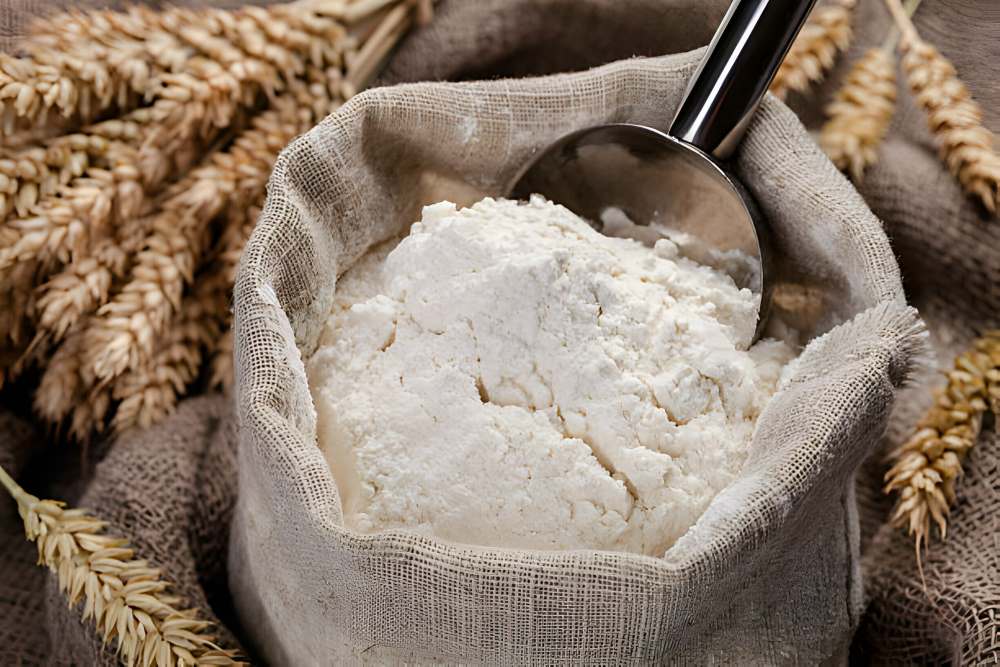In today’s health world, the focus on nutrition has grown, leading people to consider their food choices. An important yet often underestimated aspect of these decisions is the type of Organic flour used in cooking and baking.
Organic flour, made from grains grown using sustainable and natural farming methods has become popular for its health benefits.
This article delves into the perks of incorporating flour into your diet revealing how this simple change can greatly support and enhance your fitness goals.
Unveiling Organic Flour
At the heart of the flour movement is a dedication to farming practices that prioritize sustainability by avoiding synthetic pesticides and fertilizers commonly found in traditional agriculture.
As a result grains used for flour are cultivated without chemicals resulting in a final product free from pesticide residues and chemical contaminants. At the core of the organic flour movement lies a commitment to organic farming principles.
Maintaining Nutrient Richness
A feature distinguishing organic flour is its minimal processing compared to conventional flour, which often undergoes extensive refinement.
This means organic flour retains nutrients overall. The preservation of nutrients, like vitamins, minerals, and antioxidants helps make the flour a nutritious choice that plays a role in meeting daily dietary needs.
Loaded with Vital Nutrients
Organic flour especially when derived from grains stands out as a source of essential nutrients. This includes B vitamins for energy production, iron for carrying oxygen in the body, magnesium for muscle function and fiber for digestive well-being.
The presence of these components positions flour as a rounded nutritional option that supports different bodily functions crucial for overall health and wellness.

Promoting Digestive well-being
Giving importance to grains in flour becomes key in promoting good digestive health. The high fiber content helps maintain a gut environment prevents constipation and aids in weight management.
Moreover, the processed nature of flour contributes to better digestion processes by ensuring efficient absorption of nutrients present in the flour.
Minimizing Exposure to Substances
Opting for flour is a smart move to reduce exposure to harmful chemicals linked with conventional farming practices. Pesticides and synthetic fertilizers commonly used in organic farming have been associated with various health risks.
Choosing to use flour is a step towards reducing the intake of harmful substances and establishing a safer and healthier foundation for starting a fitness journey.
Improving Taste and Texture
Apart from its benefits, flour often enhances the flavor and texture of dishes. The processed nature of flour adds a subtle nutty taste and a more substantial texture to baked goods.
This enhancement does not enhance the eating experience. It also encourages a greater appreciation for the natural nutritious qualities of the ingredients. This enhancement not only elevates the sensory experience of meals but also fosters a deeper appreciation for the wholesome, nutritious nature of the ingredients.

Environmental Impact
Opting for flour goes beyond health benefits to include positive environmental effects. Organic farming methods prioritize soil health, biodiversity, and sustainable agriculture.
By supporting farming individuals actively contribute to preserving ecosystems and promoting an eco approach to food production. The decision to incorporate organic flour into one’s diet extends beyond personal health considerations to include positive environmental impact.
These impacts can have both negative aspects however, the focus is usually on highlighting how human activities can harm ecosystems, biodiversity, air quality, water quality, and overall ecological balance.
Transitioning Process
Shifting to using flour in your cooking routine is a gradual satisfying journey. Start by exploring brands that follow organic farming guidelines.
Experimenting with types of flours, like whole wheat, spelt or oat flour can help you explore their distinct flavors and textures. Taking this approach ensures a transition while maximizing the nutritional advantages of organic flour in your diet.
Incorporating Organic Flour into Your Recipes
When it comes to using flour in your recipes its versatility allows for incorporation into a wide range of dishes from artisanal bread and muffins to pasta and pancakes.
Experimenting with diverse grains and flours adds variety to the diet, ensuring a consistent intake of essential nutrients while keeping meals exciting and satisfying.
You can easily swap flour for flour without sacrificing taste or texture. Trying out grains and flours adds diversity to your meals ensuring an intake of essential nutrients while keeping your dining experience interesting and gratifying.

Conclusion
In conclusion, every dietary decision plays a role in achieving a more sustainable lifestyle. Organic flour emerges as a nutrient choice that not only supports your fitness goals but also aligns with environmentally conscious eating habits.
By switching to flour you equip yourself with a yet powerful tool for improving overall well-being. Embracing the benefits of flour signifies a significant step towards living a healthier, more nourished and fitness-oriented life.
As the awareness of nutrition continues to grow, the incorporation of organic flour stands as a testament to the interconnectedness of personal health and environmental sustainability.












